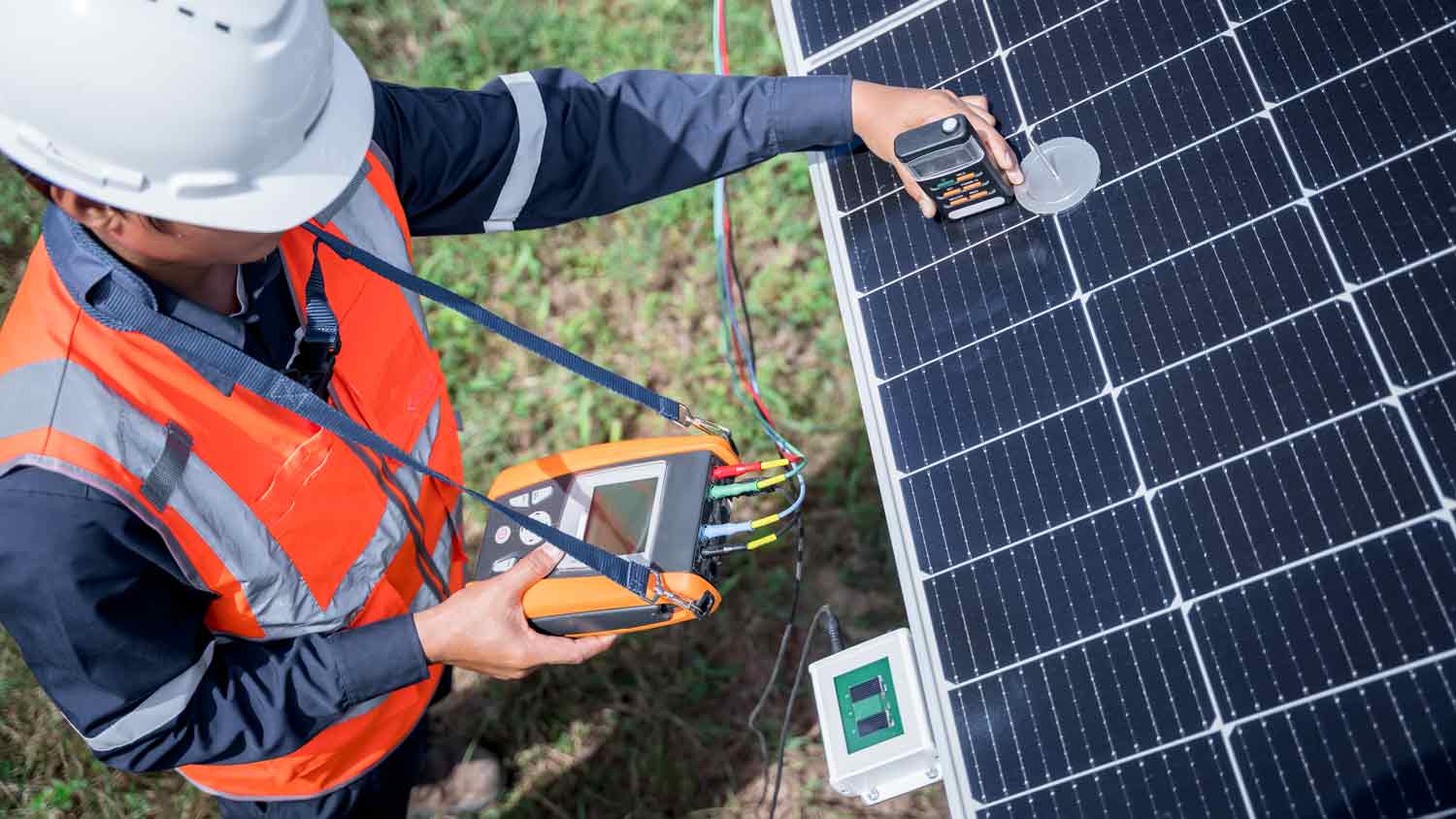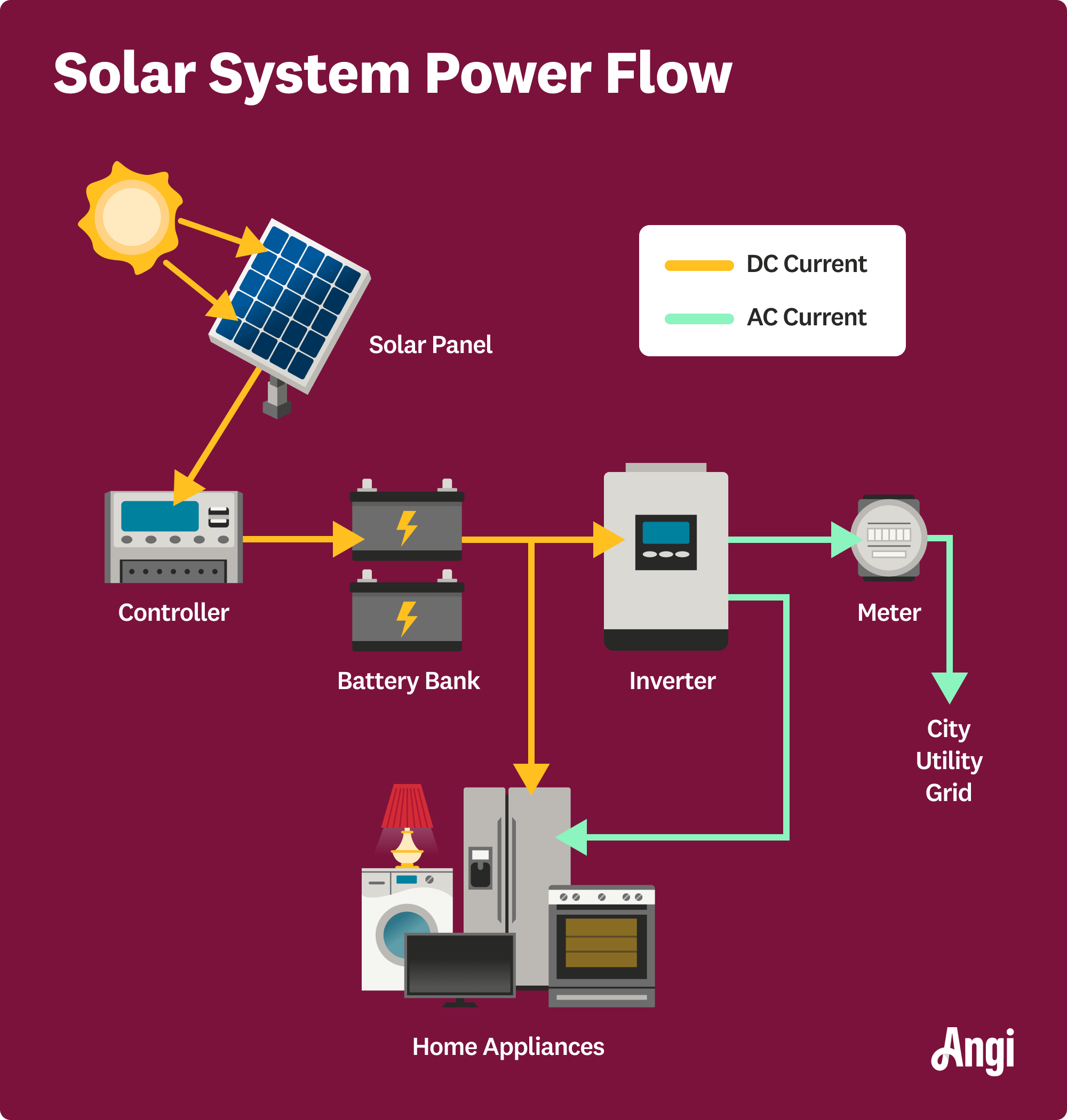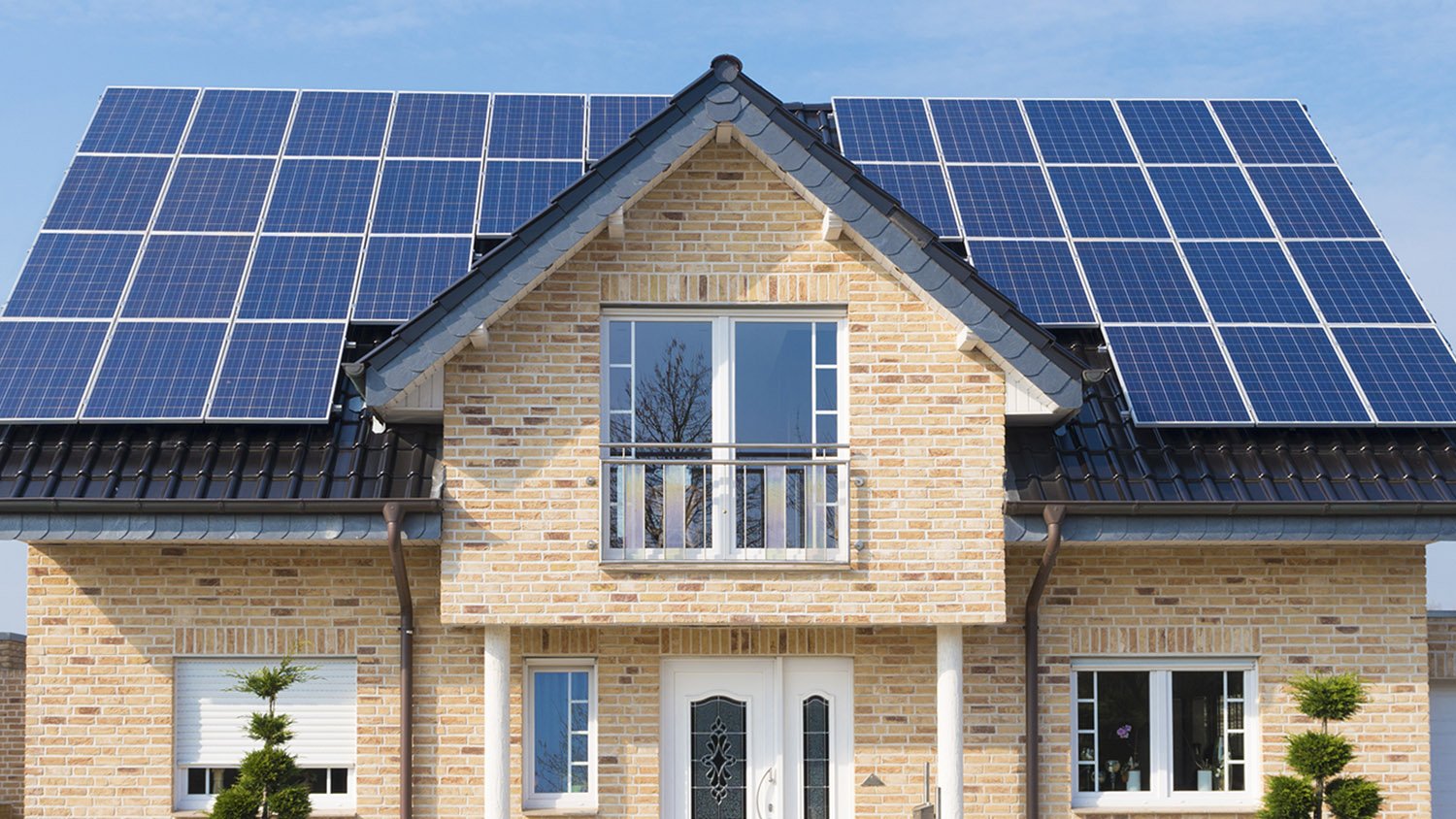
Discover the average solar panel inspection cost, what impacts pricing, and how to save. Get expert tips to keep your solar system efficient and safe.
Solar batteries cost an average of $10,000, with actual costs ranging from $6,000 to $12,000, depending on the scope of the project and the cost of labor in your area.


Most homeowners spend between $400 to $750 per kilowatt hour for a solar battery.
You’ll pay about $400 to $750 for a solar battery with a capacity of 1 kilowatt and about $8,000 to $15,000 for a solar battery with a capacity of 20 kilowatts.
Plan to pay around $2,000 to $3,500 in labor in addition to the cost of the solar battery system.
Homeowners can receive a 30% tax credit for installing a solar battery system thanks to the 2022 Inflation Reduction Act.
Most homeowners spend an average of $10,000 on solar battery costs, though prices typically range between $6,000 and $12,000. The total cost includes the battery system itself and the labor to install it.
Whether you’re ready to take your love of reusable batteries to the next level or make use of that excess solar energy your solar panels generate, investing in a solar battery system is a great way to harness the power of the sun for free electricity. But before you can start saving, here’s how you can budget for the cost of installing a solar battery system.
The brand you choose for your solar battery impacts the price. Even batteries of the same size vary in cost across different brands. Here are the average starting solar storage battery costs by brand:
| Solar Battery Brand | Average Starting Cost |
|---|---|
| EG4 | $8,500 |
| Enphase | $9,500 |
| Franklin | $10,500 |
| Generac® | $12,400 |
| Growatt | $8,200 |
| HomeGrid | $9,000 |
| LG | $6,000 |
| Panasonic | $7,000 |
| SolarEdge | $11,500 |
| sonnenCore+ | $10,500 |
| SunPower® | $12,000 |
| Tesla | $9,500 |
While the size of your home is an important factor in determining battery capacity, you also need to consider your lifestyle and how much electricity you normally use. A smaller home that relies on air conditioning most of the year and has an EV may need a larger battery than a homeowner in a cooler climate.
Your system’s capacity will be the biggest cost factor, with most solar battery systems running anywhere between $400 and $750 per kilowatt-hour (kWh). The average capacity of a solar battery is around 10 kWh, meaning you’ll pay anywhere from $4,000 to $7,500 for a typical solar battery system, not including the installation.
However, you can purchase individual batteries for much smaller partial solar battery systems or larger systems for homes that need more than the average capacity. To choose the right capacity for your home, talk with a solar pro to learn how many solar batteries are needed to power your house or how to size batteries for solar.
| Solar Battery Capacity (kWh) | Price Range |
|---|---|
| 1 kWh | $400–$750 |
| 3 kWh | $1,200–$2,250 |
| 5 kWh | $2,000–$3,750 |
| 10 kWh | $4,000–$7,500 |
| 15 kWh | $6,000–$11,250 |
| 25 kWh | $8,000–$15,000 |
Labor accounts for another $2,000 to $3,500 on top of the cost of your solar battery system. You could pay less for labor if your system is smaller, while larger systems require more time and a higher labor cost.
There are a few reasons you might pay more or less for solar battery installation depending on the state you live in: local utility rates, climate conditions, and differing labor costs are a few.
Some states also have state-specific solar battery incentives, like tax exemptions and rebates. Here are states with solar battery incentives and the average cost of installing solar batteries for each.
| State | Solar Battery Incentive | Average Installation Cost |
|---|---|---|
| California | Self-Generation Incentive Program (SGIP) | $8,200 |
| Hawaii | Battery Bonus Program | $10,500 |
| Maryland | Maryland Energy Storage Income Tax Credit (MESITC) Program | $10,000 |
| Massachusetts | Solar Massachusetts Renewable Target (SMART) Program | $11,200 |
| New York | NY-Sun Initiative | $12,100 |
| Oregon | Solar + Storage Rebate Program | $14,000 |
Brand, capacity, labor, and location all influence the price of solar batteries. Below, we discuss other factors that can impact cost. Considering how these factor into your project will help make your estimate more accurate.
The types of solar batteries you choose will impact the cost of your system by a difference of $2,000 to $15,000. The most common types of batteries in a solar battery system include lead-acid, lithium-ion, and lithium-iron-phosphate, though lead-acid batteries are no longer being used in modern setups.
Below is a breakdown of each battery type for a whole-house battery system:
| Solar Battery Type | Average Cost | Properties |
|---|---|---|
| Lead-acid | $5,000 – $15,000 | Most affordable and oldest option, but requires extra maintenance |
| Lithium-ion | $7,000 – $30,000 | Long-lasting and low-maintenance, but moderately priced |
| Lithium-iron-phosphate | $9,000 – $30,000 | Long-lasting, efficient, and low-maintenance, but higher price tag |
The more solar batteries you need, the more your system will cost. Your solar provider can tell you how many batteries to buy based on your home’s energy usage and the storage capacity of the solar batteries you choose.
It’s also wise to think about your current and future needs. While you can save money by installing the fewest number of batteries that can meet your home’s needs, you’ll likely pay more in the future for installation and product costs if you have to add more.

If you’re installing a solar battery system away from electrical wiring and outlets, you may end up paying $6 to $10 per square foot to hire an electrician near you to rewire your house. Simple rewiring projects cost around $1,600. A solar battery that is easy to install and has immediate access to your electrical system is a less complex project for installers, while a solar battery far away from your electrical system could cost more.
If your solar battery system stores DC energy but doesn’t come with a built-in inverter, anticipate spending an extra $1,000 to $1,500 on a solar power inverter. Most solar batteries need an inverter to convert direct-current (DC) electricity into alternating-current (AC) electricity so that your home appliances can use the electricity.
A critical or backup load panel costs between $1,000 and $2,000 on average. This panel may be crucial for homes that need essential technology or medical equipment to stay on when there’s a power outage.

Solar batteries work in tandem with solar-energy collectors. That means if you don’t already have solar panels or solar shingles, you’ll have to install collectors to generate electricity for the battery system. Either option goes hand-in-hand with solar batteries, though solar panels are far more common.
Solar panels cost: $18,400–$36,400
Solar shingles cost: $21,000–$50,000
It always pays to shop around and get at least three quotes for your project. A solar installer can help estimate how many solar shingles or panels you’ll need for your roof.
Like most diverse systems for homes, the cost of a solar battery system isn’t always straightforward. There are costs that you might need to consider in the long term for your solar battery, including maintenance and repairs.

On average, hiring a local solar repair pro to inspect and maintain your battery system costs between $150 and $300. Vincent Curcie, a solar installation contractor, recommends, “Schedule maintenance every one to two years for firmware updates and diagnostics. Some manufacturers even offer remote monitoring and support.”
Maintenance includes an inspection, rotating the batteries, and cleaning the terminals.
Fully integrated solar battery systems often come inside a protective storage container, which can be convenient and discreet, but also more challenging to repair if the box itself breaks. You might also need to contact a professional through the company you purchased your solar battery system from to avoid nulling any warranties.
The cost to replace a solar battery depends on the capacity of the battery in question. You’ll usually pay for the cost of the battery itself, and any installation costs if you need to hire a pro to replace it. Some smaller batteries can be replaced without a pro.
Keep in mind, this price may be significantly lower if you’ve used a combination of solar batteries in your system rather than a single, high-capacity battery. However, most solar batteries last between 10 and 15 years, so when it’s time to replace your batteries, you may be better off replacing the entire system if all of your batteries have expired. If you only have one faulty, low-capacity battery in your system, replacing it could cost less than replacing the whole system.
Many solar battery systems are versatile, meaning you can replace an old battery with a new one with relative ease. Just like with standard batteries, you should avoid mixing and matching the type of batteries you have in your system. For example, if you use lithium-ion batteries of one amp-hour capacity, don’t replace one old battery with lead-acid batteries that have a different capacity.
While the up-front cost of going solar may be enough to stop you in your tracks, you could cut the costs of your solar system substantially by taking advantage of a recently passed tax credit. As part of the 2022 Inflation Reduction Act, homeowners can now receive a 30% tax credit for installing solar battery systems and solar panels. This means you could spend closer to $8,000 for the average solar battery system.
The credit will decrease to 26% in 2033 and decrease again to 22% in 2034 before expiring in 2035.
You should never attempt to install a solar battery on your own. Instead, hire a licensed and well-reviewed solar installer near you.
If you’re adding a solar battery to your home’s solar power system, you should always hire a certified solar installer. Here’s why:
Working with solar power and electrical systems typically requires a permit and always requires a thorough understanding of local building codes. Solar installers in your area can navigate the permit process for you and ensure the solar battery installation is up to code.
In many cases, a solar battery’s warranty may require professional installation, and you may not be eligible for rebates if you attempt to install the battery yourself.
Working with any solar equipment requires specialized knowledge, training, and tools. Even handy homeowners likely do not have the breadth of experience required to work with solar equipment.
There’s often electrical work involved, which includes risk of shock and electrocution if you don’t know what you’re doing.
Solar batteries are also often tied to the local grid; this also requires special permits and knowledge. It may also trigger a formal inspection.
A professional solar installer can also guide you through the selection process, finding the right type of battery and the correct capacity.
There’s no question that solar batteries are a major investment. As such, you’ll want to find ways to reduce the cost. Here are a few tips for saving money on solar batteries.
Install solar batteries with solar panels: You can save money by installing solar panels along with the solar batteries in a single installation rather than separately.
Apply for the federal solar tax credit: With this tax credit, you can save 30% on the cost of your solar battery system, so be sure to file for it on your tax return.
Look for local rebate programs: Some states, like California and New York, offer different compensation programs, so always check with your local government and utility companies for solar incentives.
Compare solar company brands: When comparing different solar battery brands, look at customer reviews, warranty offerings, and product quality. A more expensive brand might offer better energy efficiency and a longer life span, providing better value in the long run.
While solar batteries can make use of excess solar energy from your solar panels, they’re not for everyone. You can explore the pros and cons of solar battery storage and decide if it’s the right fit for your home. That said, solar batteries may be worth it if you:
Live in a state with time-of-use electricity pricing
Live in an area prone to power outages
Energy independence is a priority
Work from home and need access to your devices and internet, rain or shine
Want to lower your carbon footprint and have a zero-energy home
Don’t have net metering
Don’t want to use your solar panels directly without a battery
Live off-grid and depend on backup storage
Depend on a backup battery for your medical equipment
Net metering programs allow you to offset your utility bills, but not all states have the same net metering policies, and some states don’t offer a mandatory net metering program at all. A few examples of states with fewer net metering incentives include Georgia, Mississippi, Idaho, and Texas. You can go to the Database of State Incentives for Renewables and Energy Efficiency (DSIRE) to search for local incentives.
Batteries for home solar can save you anywhere between $700 and $1,100 per year, depending on the size of your system. If you purchase a standard-sized solar battery, you’ll pay around $10,000. If you apply for the solar tax credit, you can lower this price by 30%. This means it will take anywhere from six to 10 years to pay off your solar battery system and start seeing the savings.
Remember, some local rebates and incentives can save you more than the 30% tax credit or offer a better net metering program, potentially allowing you to pay off your system in as little as five years. So check with your local electric companies and municipality for savings in your area.
Take advantage of the fact that your solar installer has specialized knowledge. Ask for their recommendations on battery type, brand, and capacity to make the best choice for your home and energy consumption.
They should also weigh in on how many solar batteries you need.
You can also ask them for maintenance tips to get the most out of your solar panels and the battery itself.
Ask about what permits and inspections are required and if those are already reflected in their installation quote.
Home is the most important place on earth, which is why Angi has helped more than 150 million homeowners transform their houses into homes they adore. To help homeowners with their next project, Angi provides readers with the most accurate cost data and upholds strict editorial standards. We extensively research project costs to develop the pricing data you see, so you can make the best decisions for you and your home. We rely on reputable sources, including the U.S. Bureau of Labor Statistics, academic journals, market studies, and interviews with industry experts—all to ensure our prices reflect real-world projects.
Want to help us improve our cost data? Send us a recent project quote to [email protected]. Quotes and personal information will not be shared publicly.
From average costs to expert advice, get all the answers you need to get your job done.

Discover the average solar panel inspection cost, what impacts pricing, and how to save. Get expert tips to keep your solar system efficient and safe.

Get a detailed estimate of solar farm costs. Learn about average prices, key cost factors, and ways to save when planning your solar farm project.

There are a few factors to consider when it comes to solar panel repair costs. This guide breaks down the prices of solar panel removal, repair, and replacement.

How do solar panels work and what exactly do they do? Learn all about solar power generation to decide if it’s the right decision for your home.

Solar shingles are an unobtrusive alternative to solar panels. Learn more about them to decide if solar shingles are worth installing on your roof.

There are three types of solar panels: monocrystalline, polycrystalline, and thin-film. Before choosing one for your home, here are the pros and cons of each.